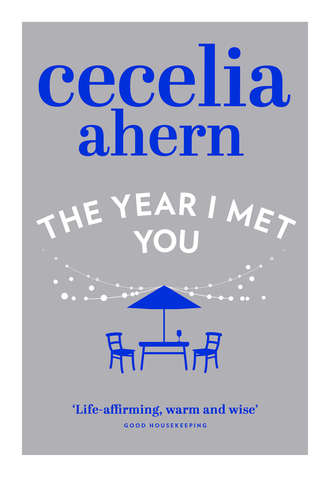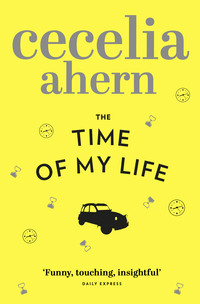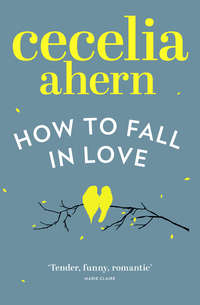
Полная версия
The Year I Met You
She nods. Big eyes. Holds her arms out to show what would be a disappointingly small wave, but an enormous stretch for her.
‘And weren’t they crashing up against the rocks? Tell Jasmine.’
She nods again. ‘They were crashing against the rocks.’
‘And the waves were splashing over on to the coast road in Malahide,’ he says, again in his childish voice, and I wish he would just tell me the story directly instead of relaying it like this.
‘Wow,’ I say, smiling at Zara and reaching out to her. She immediately comes to me and wraps her skinny long legs around my body and clings to me tightly. I do not have anything against Zara. Zara is lovely. No – Zara is beautiful. She is perfect in every way and I adore her. It is not Zara’s fault. It is not anybody’s fault, because nothing has happened and it is merely the annoyance of my dad making a habit of dropping by since I’ve been at home that is beginning to create something that is not there. I know this. I tell my rational self this.
‘How’s my spaghetti legs?’ I ask her, letting us into the house. ‘I haven’t seen you for an entire year!’ While I’m talking, I glance at your house. I do that a lot lately, I can’t seem to help it. It’s become a habit now, some ridiculous OCD thing where I can’t get into my car without looking across the road, or I can’t close my front door without looking, or sometimes when I pass a front window, I stop and watch. I know I need to stop. Nothing ever happens during the day time, not with you, at least; you barely surface, it’s just your wife coming and going with the kids all day. Occasionally I might see you pull a curtain open and go out to your car, but that’s it. I don’t know what I’m expecting to see.
‘Did you tell your dad that we made cupcakes together last week?’ I ask Zara.
She nods again and I realise that I’m doing exactly what Dad does. It must be frustrating for her, but I can’t seem to stop.
Dad and I talk to each other through Zara. We say things to her that we should be saying to one another, so I tell her that my electricity went off on New Year’s Eve, that I met Billy Gallagher in the supermarket and he has retired, and various other things that she doesn’t need to know. Zara pays attention for a while, but then we confuse her, and she runs off.
‘Your friend is in trouble again,’ Dad says when we’re sitting at the table with a cup of tea and biscuits left over from my enormous drawer of Christmas goodies that I’m consistently working my way through, and we watch Zara tip over the box of toys that I keep for her. The noise of Lego hitting floorboards takes away his next sentence.
‘What friend?’ I ask, worried.
Dad nods in the direction of the front window that faces your house. ‘Your man – what’s his name?’
‘Matt Marshall? He’s not a friend of mine,’ I say, disgusted. All talk always turns to you.
‘Well, your neighbour then,’ Dad says, and we both watch Zara again.
It’s only the silence dragging on for too long that causes me to ask, because I don’t know what else to say: ‘Why, what did he do?’
‘Who?’ Dad says, snapping out of his trance.
‘Matt Marshall,’ I say through gritted teeth, hating having to ask about you once, never mind twice.
‘Oh, him.’ As if it was an hour ago that he first raised it. ‘His New Year’s Eve show got complaints.’
‘He always gets complaints.’
‘Well, more than usual, I suppose. It’s all over the papers.’
We are silent again as I think about your show. I hate your show, I never listen. Or rather, I never used to listen but lately I’ve been listening to see if what you talk about has any direct link to the state you return home in, because you’re not trashed every single night of the week. About three or four nights a week. Anyway, so far there seems to be no direct correlation.
‘Well, he tried to ring in the New Year by getting a woman to—’
‘I know, I know,’ I say, interrupting him, not wanting to hear my dad say the word orgasm.
‘Well, I thought you said you hadn’t heard it,’ he says, all defensive.
‘I heard about it,’ I mumble, and I climb down on all fours to help Zara with her Lego. I pretend our tower is a dinosaur. I use it to eat her fingers, her toes, then I crash it into the second tower with a great big roar. She’s happy with that for a moment and goes back to playing by herself.
To recap on your New Year’s Eve show, you and your team felt it would be hilarious to ring in the New Year with the sound of a woman’s orgasm. A charming treat for your listeners, a thank you in fact, for their support. Then you had a quiz to guess the sound of a fake orgasm from a real orgasm, and then a full discussion about men who fake orgasms during sex. It wasn’t offensive, not to me, not in comparison to the filth you’ve spoken about in other shows, and I hadn’t been aware of men who faked orgasms so it was slightly informative, if not disturbing, maybe even personally enlightening – with regard to the man I didn’t regret in the office, who regretted me, possibly – though the douche-bags you had on the show to tell their side of their story did little to educate. I sound as if I’m defending you. I’m not. It just wasn’t the worst show. For once the issue is not you and your lack of charm but the right to hear the sound of a woman climax without it being considered offensive.
‘How is he in trouble?’ I ask moments later.
‘Who’s that?’ Dad asks and I count to three in my head.
‘Matt Marshall.’
‘Oh. They’ve fired him. Or suspended him. I’m not sure which. I’d say he’s out of there. Been there long enough anyway. Let somebody younger have a chance.’
‘He’s only forty-two,’ I say. It sounds like a defence of you, but I don’t mean it personally. I’m thirty-three and I need to find a new job, I’m concerned about age right now, particularly the attitude towards age in the workplace, that’s all. I think of you suspended and I immediately feel delight. I’ve always disliked you, have always wanted your show off the air, but then I feel bad and I’m not sure why. Maybe it’s because of your children and your nice wife, who I’ve taken to waving at in the morning.
‘Turns out it was a real woman in the studio,’ Dad says, looking a bit uncomfortable.
‘Well, it hardly sounded like a man.’
‘No, she was really … you know,’ he looks at me and I’ve no idea what he is implying.
We are quiet.
‘She was really pleasuring herself. Live in the studio,’ Dad says.
My stomach turns, both because I’ve just had that conversation with my dad and also because I can see you orchestrating that in your studio, the countdown to twelve o’clock, the team all guffawing over a woman, like idiots.
I once again loathe you.
I lift Zara into her car seat and plant a kiss on her button nose.
‘So I could talk to Ted, if you like,’ Dad says suddenly, as though continuing a conversation that I don’t remember having.
I frown. ‘Who’s Ted?’
‘Ted Clifford,’ he shrugs like it’s no big deal.
Anger rises within me so quickly I have to fight the urge to lose it right there. And I’d come so close. Dad sold his company to Ted Clifford. He could have sold it for three times the amount in the good times, he likes to tell everybody, but it is not the good times now and so he settled on a reasonably good sum of money that will ensure month-long holidays in the summer with Leilah and Zara, dinners out four times a week. I don’t know if he paid off his mortgage, and this annoys me. It would have been the first thing I’d have done. I’m not sure how me and Heather have come out of this, but I’m not bothered, though I might sound it. I’m financially okay right now, I’m more concerned about Heather. She needs security. As soon as I made enough money, I bought the apartment she was renting. She moved out of residential care five years ago, a big deal for her, a big deal for anybody. She lives with a friend, under the caring eye of her support assistant, and they are getting along perfectly well together, though it doesn’t stop me from worrying about her every second of every day. I got the apartment at a good price; most people were trying to get rid of their negative equity, that second property where it was suddenly a struggle to meet the payments. It was something I expected Dad to do when he retired, instead of buying the apartment in Spain. He thought she was fine in the care home, but I knew that it was a dream for her to have her own place so I took control. Again, I’m not angry, it’s just that things like this come to me now and I can’t help but ponder them … I need distraction.
‘No,’ I say abruptly. ‘Thanks.’ End of.
He looks at me as if he wants to say more. To stop him, I continue: ‘I don’t need you to get me a job.’
My pride. Easily damaged. I hate help. I need to do things all by myself, all of the time. His offer makes me feel weak, makes me think that he thinks I’m weak. It has too many connotations.
‘Just saying. It’d be an easy foot in the door. Ted would help you out any day.’
‘I don’t need help.’
‘You need a job.’ He chuckles. He looks at me as though he is amused, but I know that this is the precursor to his anger. That laugh is what happens when he’s annoyed; I’m not sure whether it is supposed to wind up the person he is annoyed at – which is what happens now and has always happened to me – or if it is his way of covering up his anger. Either way, I recognise the sign.
‘Okay, Jasmine, do it your way, as usual.’ He holds his hands up dramatically in the air, in defence, keys dangling from his fingers. He gets into the car and drives off.
He says it like it’s a bad thing: do it your way. Isn’t that a good thing for anyone to do? When would I ever, have I ever, wanted to do it his way? If I wanted help, he would be the last person I would go to. And then it occurs to me again that there seems to be an issue, when there really never has been an issue, and it startles me. I realise I’m standing out in the cold, glaring down the street at where the car has long since disappeared. I quickly look across the street to your house and I think I’ve seen a slight movement in an upstairs curtain, but I’ve probably imagined it.
Later, in bed, I’m unable to sleep. I feel as though my head is overheating from thinking too much, like my laptop when it’s been used for too many hours. I am angry. I am having half-finished conversations with my dad, with my job, with the man who stole my space in the car park that morning, with the watermelon that I dropped carrying from the car to the house which burst all over the ground and stained my suede boots. I am ranting to them all, I am setting everything right, I am cursing at them, I am informing them all of their shortfalls. Only it doesn’t help, it is just making me feel worse.
I sit up, frustrated and dehydrated.
Rita the Reiki woman I’d seen earlier that day told me this would happen. She’d told me to drink lots of water after our unusual session that I feel didn’t alter me at all, and instead I had a bottle of wine before bed. I’d never been to Reiki before and I probably won’t go again but my aunt had given me a voucher for Christmas. My aunt is into all kinds of alternative therapy; she and my mum used to do that kind of thing when Mum was sick. Maybe that’s why I don’t believe in it now, because it didn’t work, Mum died. But then the medicine didn’t work for her either, and I still take that. Maybe I will go back. I made the appointment when everybody went back to work, something to do, something to keep myself busy, something to put in my new yellow Smythson diary with my initials in gold on the bottom right corner which would usually be filled already with appointments and meetings and now is a sad depiction of my current life: christening times, coffee meetings and birthday celebrations. At the Reiki session I’d sat in a small white room that was filled with incense and made me feel so sleepy I wondered if I was being drugged. Rita was a tiny woman, bird-like, in her sixties, but she twisted her legs into a position on the armchair that showed her agility. She was soft-faced, almost out of focus, and I’m not sure if it was the incense smoke that blurred her, but I couldn’t quite see her edges. Her eyes were sharp though, the way they took me in and held on to every word that I said so that it made me take note of my own voice and I could hear how clipped and contained I sounded. Anyway, apart from a nice chat with a supportive woman, and a relaxing twenty-minute lie-down in a nicely scented womb-like room, I didn’t feel in any way altered.
She’d given me one piece of advice though for my busy head. I’d immediately disregarded it as soon as I’d left, but now I am barely able to formulate a single thought for long enough to be able to see it through, to process it, to get rid of it, so I take her advice. I remove my socks and pad around the carpet for a while, hoping I’ll feel ‘rooted’ to stop my head from drifting again into ranty angry territory. I step on something sharp – the end of a clothes hanger – and curse as I inspect my foot. I cradle my foot in my hands. I’m not sure how rooted is supposed to feel, but this can’t be it.
She’d suggested walking barefoot, preferably on grass, but if not, generally barefoot as much as possible as soon as I returned to the house, The scientific theory behind the health benefits to walking barefoot, is that the Earth is negatively charged, so when you ground, you’re connecting your body to a negatively charged supply of energy. And since the Earth has a greater negative charge than your body, you end up absorbing electrons from it. The grounding effect has an anti-inflammatory effect on your body. I don’t know about all that but I need to clear my head and as I’m trying to cut down on the headache tablets, I may as well try barefoot.
I look outside. There is no grass in my garden. That was the terrible, unspeakable thing I did when I moved in four years ago. I wasn’t a fan of gardens, I was twenty-nine years old, I was busy, I was barely at home, I was never home long enough to notice my garden. To avoid the effort involved in its upkeep, I had the relatively nice garden that was there when I bought the place dug up and replaced it with maintainable cobble-locking. It looked impressive, it cost a fortune, it horrified the neighbours. I put some nice black pots outside my front door with plants that stayed green all year round, pruned into clever modern twisted shapes. I cared a little bit about how it affected my new neighbours, but I was never home to discuss it with them at length, and I reasoned with myself that it would save me paying a gardener – because I wasn’t about to do it myself; I wouldn’t know where to start. There is still grass on the pathway outside of my house, which is maintained by my neighbour, Mr Malone, who did this without asking me. I think he sees it as his because he was here first, and anyway, what do I know about grass? I am a grass-defector.
I’d thought that buying my own house at the age of twenty-nine – a semi-detached, four-bedroom family home – was quite a mature and grounding thing to do. Who knew that when I dug up the garden I was losing the very thing that could have kept me grounded.
I check your house and your jeep isn’t there and all the lights are out. I never need to worry about anybody else’s house. I never seem to care. I put on a tracksuit and go downstairs barefoot. Feeling like a sleuth, I run on tiptoe across the cold paving down my driveway and straight to the grass that lines the path. I check the grass for dog poo. I check for slugs and snails. Then I pull up the ends of my tracksuit bottoms and I allow my feet to squelch into the wet grass. It is cold but it’s soft. I chuckle to myself as I walk up and down, surveying the street at midnight.
For the first time since I’ve moved in, I feel guilty for what I’ve done to my garden. I look at the houses and see how mine is dark and grey amidst the colour. Not that there is much colour in the gardens in January, but at least the bushes, the trees, the grass, break the grey concrete of the paths, the brown and grey of my paving.
I’m not sure if going barefoot in the grass is helping anything other than the onslaught of pneumonia, but at least the cool air has soothed my hot, over-wired head and freed up some space. This is unusual behaviour for me. Not the walking on grass at midnight, but the lack of control. Sure, I’ve had stressful days at the office where I’ve needed to regroup, but this is different. I feel different. I’m thinking too much, focusing on areas that didn’t require thinking about before.
Often, when I’m searching for something, the only way I can find anything is to acknowledge out loud what it is, because I can’t see it unless I fully register and envision in my mind what it is I’m looking for. For example, rooting around in my oversized handbags for my keys, I say either in my head or aloud, ‘Keys, keys, keys.’ I do the same in my house: I wander from room to room, saying or muttering, ‘Red lipstick, pen, phone bill …’ or whatever it is I’m looking for. As soon as I do that, I find the thing quicker. I don’t know the reason for this, but I know that it makes sense, that it’s true, that Deepak Chopra would be able to explain in a more sophisticated, informed, philosophical manner, but I feel that when I tell myself what it is I’m looking for, then I fully know what it is that I must find. Order given: dutiful body and mind respond.
Sometimes the very thing I am looking for is staring me straight in the face, but I can’t see it. This happens to me a lot. It happened this morning when I was looking for my coat in my wardrobe. It was right in front of me, but because I didn’t say, ‘Black coat with the leather sleeves,’ it didn’t appear to me. I was just idly searching, eyes running over clothes and not finding anything.
I think – in fact, I have come to know – that I have applied this thinking on a larger scale, I’ve applied it to my life. I tell myself what I want, what I am looking for, I envision it so that it’s easier to find, and then I find it. It has worked for me all my life.
So now I find myself in a place where all that I’ve envisioned and worked hard for has been taken away, it is not mine any more. First thing I do is try to get it all back again, make it mine again, straight away, immediately; and if that’s not possible – which it usually isn’t, because I’m a realist, not a voodoo practitioner – then I must find something else to look for, something else to achieve. I’m obviously talking about my job here. I know I will get back to work eventually, but I have been put on hold. I have been stalled, and there is nothing I can do about it.
I’m on what is called ‘gardening leave’. It has nothing to do with gardening, thankfully, or I’d have a very long year power-hosing and weeding between the cracks of my cobble-locked garden. Gardening leave is the practice whereby an employee who has left their job or who has been terminated is instructed to stay away from work during the notice period, while still remaining on the payroll. It’s often used to prevent employees from taking with them up-to-date and perhaps sensitive information when they leave their current employer, especially when they are leaving to join a competitor. I wasn’t leaving to join a competitor, as I’ve already explained, however Larry felt certain that I would work with a company we were in relative competition with, a company I had tried to schmooze to buy ours. He was right. I would have worked with them. They called me the day after I was fired to offer me a job. When I told them about the gardening leave they said they couldn’t possibly wait that long – twelve months gardening leave!! – and so they went off to find somebody else. Not only has the length of my gardening leave chased away other employers, I have absolutely nothing to do while I wait. It feels like a prison sentence. Twelve months gardening leave. It is a sentence. I feel as if I’m gathering dust on some shelf while the world is moving on around me and I can’t do anything to stop it or join in. I don’t want my mind to start growing moss; I’ll need to continuously power-hose it, to keep it fresh.
Blades of wet grass stick to my feet, working their way up my ankles as I walk back and forth on the patch of grass. So what happens when I’m put on hold for an entire year and there’s nothing I can do about it? What do I do?
I pad up and down on the wet grass, my feet starting to feel cold but my mind buzzing with a new idea. A new project. A goal. An objective. Something to do. I must right a wrong. I will uproot the very ground I walk on, which will be easy because I feel as if I have been uprooted already.
I will give the neighbourhood a gift. I will bring back the garden.
5
‘He’s beautiful,’ I whisper, looking at the tiny baby in my friend Bianca’s arms.
‘I know,’ she smiles, gazing at him adoringly.
‘Is it amazing?’ I ask.
‘Yeah, it’s … amazing.’ She looks away, her smile a bit wobbly, her eyes sunken into the back of her head from two nights’ lack of sleep. ‘Hey, have you started a new job yet?’
‘No, I can’t – you know, the gardening leave thing.’
‘Oh yeah,’ she says, then winces and goes quiet for a moment. I don’t dare interrupt her thoughts. ‘You’ll find something,’ she says, giving me a sympathetic smile.
I have grown to hate that smile on people. I am in the Rotunda Hospital, once again finding myself visiting somebody as they do something else. It has occurred to me lately that most of my visits have been this way. Calling into a friend at work, dropping by one of my sister’s classes to watch, seeing my dad while he is busy with Zara, chatting to friends while they are watching their children swimming or dancing, or at a playground. Every time I see people lately it is me interrupting their life, them busy with something – distracted heads that have one eye on me and another on their job – while beside them or across from them I am still, patiently waiting for them to finish what they’re doing to answer me. I am the still person in every scene of my life and I have started to see myself from afar each time it happens, like I’m outside of myself, watching myself be still and silent while the others move around, tend to their work, their children. Since realising this, I have tried not to meet anyone during the day when they are in the middle of something and I am not. I have tried to make appointments for nights out, dinners, drinks – times when I know we can be on even ground, face to face, one on one. But it is difficult, everybody is so busy, some can’t get a babysitter, we can’t seem to synchronise a night out that suits everybody, and so we struggle to arrange anything. It took me weeks to organise a dinner party in my house this weekend. Then I will be busy, and they can be still. In the meantime, here I am in the hospital, sitting at the bedside of one of my dearest friends who has just had her first baby, and while I am happy for her, of course I am, and was secretly delighted about the nine months maternity leave so that I could have company for the remainder of the year, I know the reality is that I will not see her very much, or if I do, she will be busy and I will be still, I will sit opposite her or beside her and wait for her to be ready, holding half her attention.
‘We were thinking, me and Tristan …’ Bianca breaks into my thoughts.
My body turns rigid as I sense what’s coming.
‘He’s not here, but I’m sure he wouldn’t mind me asking you …’
I feel dread but I fix my face into what I hope is the perfect look of interest.
‘Would you be his godmother?’
Ta-da. Third one in two months, it has to be a world record. ‘Oh, Bianca. I’d love to,’ I smile. ‘Thank you, that’s such an honour …’
She smiles back at me, delighted by her request, one of the most special moments in her life, while inside I feel like a charity case. It’s as if they’ve all made a pact to ask me to be godmother in order to give me something to do. And what will I do? Go to the church and stand by their side while they hold the baby, while the priest pours water, while everybody does something and I stand idly by.









